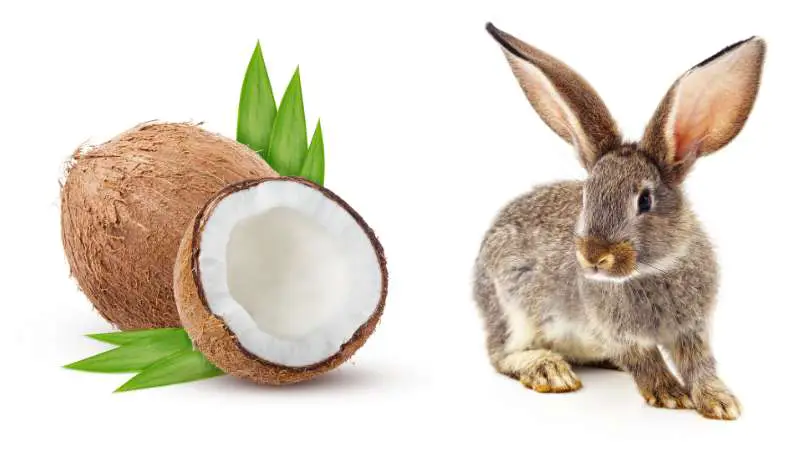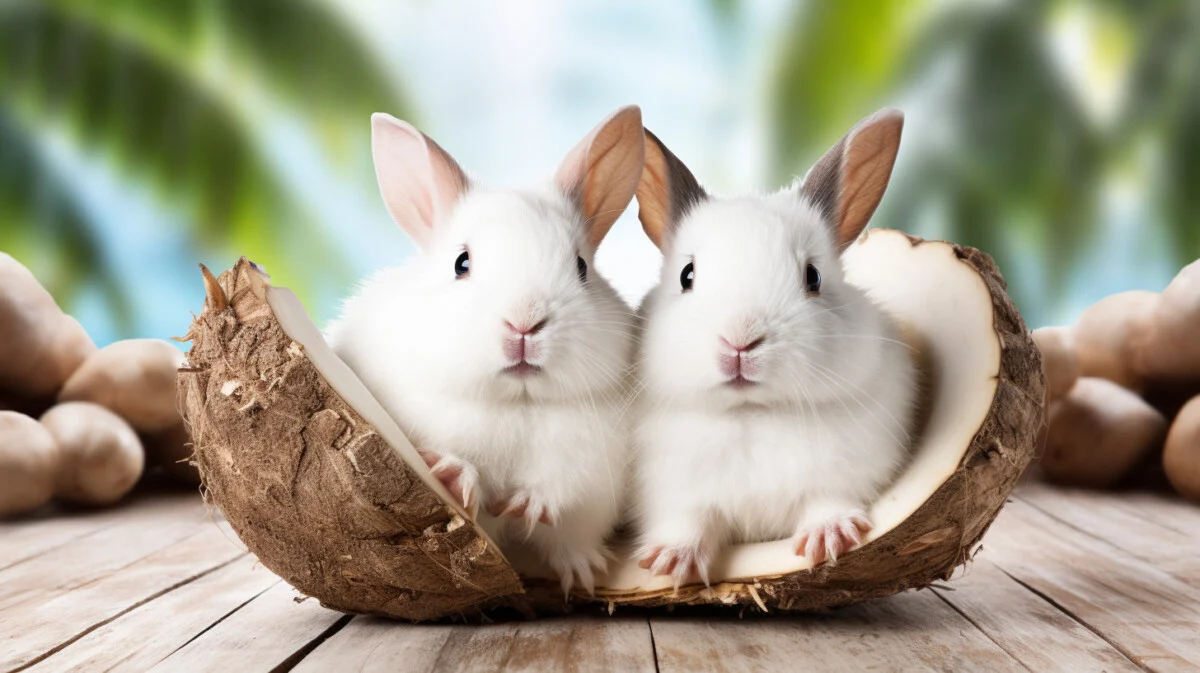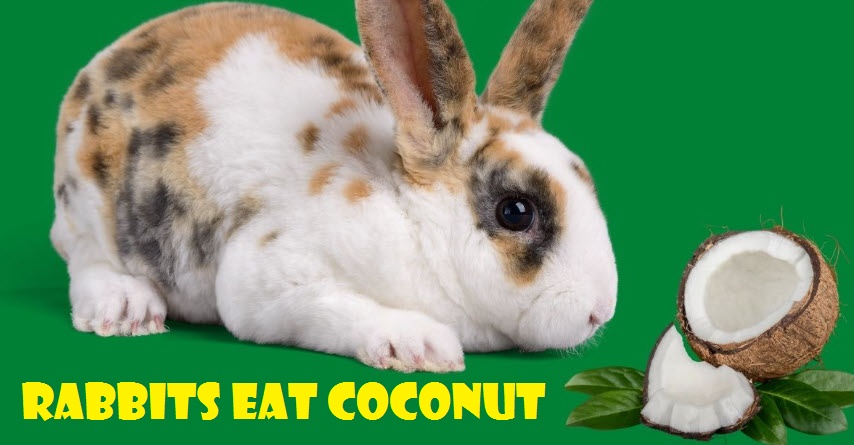Rabbits are known for their adorable appearance and gentle nature, making them popular pets for many animal lovers. Well, we’ve got you covered with the best advice and tips on feeding your rabbit coconut. These cute and cuddly creatures have unique dietary needs, so it’s essential to know which foods are safe for them to eat. And if you’re a coconut lover yourself, you may be excited to share this delicious fruit with your pet.
So, let’s dive in and discover everything you need to know about rabbits and coconuts!
Can Rabbits Eat Coconut?
Rabbits can eat coconut; the simple answer is yes, but there’s a little more to it. While coconut is not harmful to rabbits, it should be given in moderation and treated as a special treat rather than a staple part of their diet. This is because coconut is quite high in fats and sugars, which aren’t suitable for a rabbit’s daily diet. Unlike us humans, rabbits have a sensitive digestive system and need a diet primarily composed of high-fibre foods like hay and fresh vegetables.
Think of coconut as a dessert for your rabbit. Just as we don’t eat dessert at every meal, rabbits should also only have coconut occasionally. An occasional small piece of fresh or dried coconut meat can be a delightful treat for your rabbit and offer variety in their diet. However, remember to introduce it slowly and observe your rabbit for any changes in behaviour or digestive issues.
Also, it’s important to note that you should only feed your rabbit plain, unsweetened coconut. Many store-bought coconut products, like coconut flakes or chips, often have added sugars or other ingredients that can be harmful to rabbits. So, it’s best to stick with fresh or plain dried coconut, and always remove the tough outer shell before giving it to your bunny.

Understanding a Rabbit’s Diet
Understanding a rabbit’s diet is key to ensuring their overall health and well-being. Rabbits are herbivores, which means they only eat plant materials. Their diet should mainly consist of unlimited amounts of fresh hay, a handful of fresh vegetables, and a smaller portion of pellets each day. Hay, which is high in fibre, aids in digestion and should form the majority of their diet.
Vegetables provide essential vitamins and minerals, and pellets provide nutrients that are often missing from hay and vegetables. Water is also an essential part of their diet, and fresh, clean water should be made available at all times. Unlike humans and some other pets, rabbits can’t vomit, meaning that if they eat something that their body doesn’t agree with, it can cause serious issues.
So, it’s important to introduce new foods to their diet slowly and watch out for any signs of digestive discomfort. As we’ve previously mentioned, treats like coconut should be given sparingly due to their high fat and sugar content. And remember, all rabbits are unique, so what works well for one might not work for another. Always keep a close eye on your rabbit’s diet to ensure they’re healthy and thriving.
Can a Rabbit Eat Coconut Safely?
Yes, rabbits can safely eat coconut, as long as it’s fed in the right way and the right quantity. While coconut isn’t toxic to rabbits, its high fat and sugar content mean that it should be given sparingly. Serving small pieces of fresh or dried coconut is a great way to introduce this food into your bunny’s diet. Be sure to remove the hard shell and only offer unsweetened, plain coconut.
Gradually introducing it will give their digestive system time to adjust to this new food. Always monitor your rabbit after feeding the coconut, and if you notice any changes in their behaviour or signs of discomfort, stop feeding it immediately and consult a vet. It’s also essential to remember that each rabbit is different. What might be perfectly fine for one rabbit might not sit well with another. Always put your rabbit’s health first and feed coconut as a rare treat, not a regular part of their diet.
The Best Way to Offer Coconut to Rabbits
So, you’ve decided to give your rabbit a taste of coconut. Great! Now, how should you go about it? Offering coconut to rabbits involves a few key steps to ensure it’s safe and enjoyable for them. First off, always opt for fresh or plain, unsweetened dried coconut. Many packaged coconut products contain added sugars or preservatives that can harm your rabbit’s delicate digestive system.
Also, remember to remove the hard outer shell, as it can pose a choking hazard. Start by giving your bunny a small piece of coconut. It’s best to cut it into manageable chunks, about the size of a raisin. Too much coconut at once could cause an upset stomach. If your rabbit seems to enjoy it and doesn’t show any signs of discomfort, you can slowly increase the quantity.
But remember, coconut should not make up a large portion of their diet. It’s a treat, not a main meal! If you’re offering dried coconut, make sure it’s free of any additives or preservatives. Again, portion control is key. Dried coconut is more concentrated and can contain higher amounts of fat and sugar than fresh coconut. Therefore, a tiny piece is more than enough. Always monitor your rabbit after introducing new foods like coconut.
Look for changes in their behaviour, eating habits, and litter box activities. Any sign of distress should be addressed immediately by consulting with a vet. Above all, take your time, be patient, and make the coconut-tasting experience a joyful one for your bunny friend!

Potential Health Risks of Overfeeding Coconut
Feeding your rabbit too much coconut can pose potential health risks. Due to its high fat and sugar content, overconsumption of coconut can lead to weight gain and obesity in rabbits. This can further lead to a host of health problems, including heart disease, liver problems, and joint issues. In severe cases, obesity can even shorten a rabbit’s lifespan. Another risk associated with feeding too much coconut is gastrointestinal upset. A rabbit’s sensitive digestive system is designed to process high-fiber, low-fat foods.
Overloading their system with high-fat, sugary coconut can disrupt their gut flora and lead to a condition known as gastrointestinal stasis. This potentially deadly condition slows down or stops the rabbit’s gut movement, causing severe discomfort and other health complications. Lastly, excessive sugar from overeating coconut can also contribute to dental problems.
Rabbits’ teeth continuously grow throughout their life, and a high-fibre diet helps them wear down their teeth naturally. A diet high in sugars, however, can lead to dental decay and other oral health issues. While coconut can be a fun treat for your rabbit, it’s vital to limit its consumption to avoid these health risks. As always, when it comes to your bunny’s health, moderation is key.
Alternatives to Coconut in a Rabbit’s Diet
Looking for other great options for your rabbit? There are many healthy alternatives to coconut that your bunny will love. Fresh fruits like apples, pears, and berries are tasty and safe for rabbits. However, remember to remove any seeds as they can be harmful.
Similarly, veggies like bell peppers, zucchini and leafy greens like kale and spinach can be a delightful change. Some rabbits even enjoy the occasional bite of banana or melon! These foods are lower in fat and sugar than coconut, making them a healthier choice for daily snacks.
Consider offering them herbs such as parsley, mint, or coriander. Like any other treats, these should be given in moderation and should never replace the primary diet of hay, fresh water, and vegetables.
It’s always fun to explore new foods with your rabbit but remember to introduce any new treat slowly and watch your rabbit’s reaction. If you see any signs of discomfort or digestive upset, discontinue the new food immediately.
Is Coconut Oil Safe For Rabbit Skin?
When it comes to the topic of coconut oil, there’s a lot to consider. Coconut oil is often praised for its moisturizing properties and is used in a variety of skincare products for humans, but is it safe for your rabbit’s skin? The answer is yes but with some precautions. Applying a small amount of coconut oil to a rabbit’s skin can help alleviate dryness and soothe irritations
. However, it’s crucial to remember that rabbits groom themselves regularly and will likely ingest any substance put on their fur or skin. Ingesting too much coconut oil can potentially lead to digestive upset due to its high-fat content. Also, some rabbits may have sensitive skin and could react negatively to the oil.
Before applying coconut oil or any other product to your rabbit’s skin, it’s recommended to do a patch test and observe for any reactions. If your rabbit appears uncomfortable or develops a skin reaction, stop using it immediately and consult with your vet. While coconut oil can be beneficial, it should be used sparingly and under the right circumstances.
Consult Your Vet for Personalized Diet Advice
While it’s important to understand the general dietary needs of rabbits, remember that each bunny is unique and may have specific dietary requirements. It’s crucial to regularly consult with a qualified veterinarian to receive personalized diet advice for your furry friend. This is particularly important if you’re introducing new foods like coconut into their diet.
Vets can provide expert guidance based on your rabbit’s age, size, breed, and overall health. They can help you determine the appropriate portion sizes and frequency of treats like coconut. If your rabbit has any pre-existing health conditions, a vet can advise you on the best diet to manage these conditions.
They can also provide crucial information on what to look out for in case of adverse reactions to new foods. It’s always a good idea to maintain an open line of communication with your vet, regularly check your bunny’s weight, and keep an eye on their overall health. After all, our goal is to ensure that our little companions are not just surviving but truly thriving!
Can Rabbits Eat Coconut Water?
When it comes to hydrating your furry friend, you may be curious about whether coconut water is a suitable option. Coconut water is not harmful to rabbits, but it shouldn’t replace their regular water intake. This naturally sweet liquid is low in fat but contains sugars, which should be limited in a rabbit’s diet. It also lacks the essential nutrients found in fresh, clean water, which is crucial for a rabbit’s hydration and overall health.
While it may be a fun occasional treat, coconut water should not be given regularly. As with solid coconut, introduce it slowly into your rabbit’s diet and always monitor their response. Watch out for any changes in behaviour, eating habits, or litter box activities. It’s also important to note that store-bought coconut water can often contain added sugars or preservatives, which can be harmful to rabbits.
So, if you do decide to give your bunny coconut water, make sure it’s fresh and natural, with no added sugars or other additives.
FAQs
How often can I feed my rabbit coconut?
It’s best to consider coconut as a rare treat, given its high fat and sugar content. Once or twice a week, a small piece—about the size of a raisin—is more than enough.
Can I give my rabbit coconut milk or coconut water?
Coconut milk is high in fats and not suitable for rabbits. As for coconut water, while it’s not toxic, it’s best to stick to fresh, clean water as their primary drink to maintain optimal hydration and health.
Can it harm them if they eat too much?
Yes, overconsumption of coconut can lead to health issues like obesity, gastrointestinal upset, and dental problems due to its high fat and sugar content. Always monitor your rabbit’s diet and limit the consumption of coconut.
Can I use coconut oil on my rabbit’s skin?
Coconut oil can be used sparingly to soothe dry skin or irritations on your rabbit. However, be mindful that rabbits groom themselves and will likely ingest any substance applied to their fur or skin. Always do a patch test first to check for any reactions.
What other treats can I give my rabbit?
Fresh fruits like apples, pears, and berries can be delightful treats. Vegetables like bell peppers, zucchini, and leafy greens, as well as herbs like parsley and mint, can also be included. Remember, any new treatment should be introduced gradually and monitored closely.
Should I consult a vet before giving my rabbit coconut?
It’s always a good idea to consult with a vet, especially when introducing new foods like coconut into your rabbit’s diet. Vets can provide expert guidance based on your rabbit’s age, size, breed, and overall health.
Conclusion
Feeding your rabbit coconut can be a delightful treat for both of you, as long as it’s done correctly and in moderation. With its high fat and sugar content, coconut should be considered a special treat and not a staple in your rabbit’s diet.
Always opt for fresh or unsweetened dried coconut, and remember to remove the hard shell. But remember, every bunny is different. What suits one might not suit another, so always observe your rabbit closely for any signs of discomfort or changes in behaviour. Also, remember to consult your vet regularly for personalized diet advice for your furry friend.
And, of course, while trying new treats can be exciting, always keep sight of the fact that a rabbit’s primary diet should always consist of hay, fresh water, and vegetables. Happy feeding, and enjoy sharing the joy of coconuts with your rabbit!

